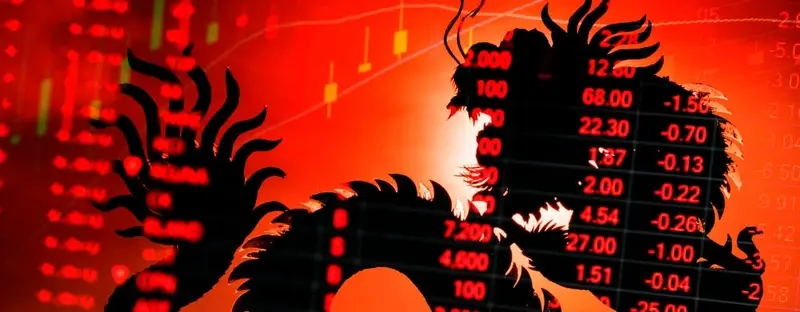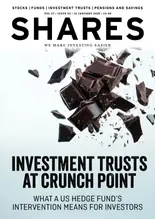
Stocks in Europe ended lower on Monday on continued Covid-19 worries in China, though curiously, London’s FTSE 100 outperformed despite its exposure to the mining sector, oil producers and Asia-focused lenders.
After dramatic scenes over the weekend in China, where protestors took to the streets to demonstrate against bruising Covid-19 restrictions, global markets were on the back foot.
The FTSE 100 index closed down 12.65 points, or 0.2% at 7,474.02 on Monday. The FTSE 250 slumped 253.35 points, 1.3%, at 19,292.35. However, the AIM All-Share closed up 3.85 points, or 0.5%, at 850.92.
The Cboe UK 100 ended down 0.1% at 748.27, the Cboe UK 250 closed down 1.1% at 16,726.11, and the Cboe Small Companies ended up 0.4% at 13,025.57.
In European equities on Monday, the CAC 40 in Paris ended down 0.7%, while the DAX 40 in Frankfurt closed 1.1% lower.
In New York, the Dow Jones Industrial Average was down 0.8% at the time of the London equities market close. The S&P 500 was 0.9% lower, while the Nasdaq Composite shed 0.8%.
The pound was quoted at $1.2025 at late Monday in London, down from $1.2090 at the London equities close on Friday. The euro stood at $1.0377, down against $1.0395 late Friday. Against the yen, the dollar was trading at JP¥138.89, down from JP¥139.22.
Chinese security forces on Monday filled the streets of Beijing and Shanghai following online calls for another night of protests to demand political freedoms and an end to Covid lockdowns.
People have taken to the streets in major cities and gathered at university campuses across China in a wave of nationwide protests not seen since pro-democracy rallies in 1989 were crushed.
‘China is a rapacious consumer of global commodities and signs economic activity is being disrupted by the mounting dissent in the country will be seen as negative for demand. It’s worth noting that unrest is already affecting business in China including Apple which has seen violent clashes at one of its facilities in Zhengzhou,’ AJ Bell analyst Russ Mould commented.
‘Part of the problem for China is vaccination levels are behind those seen in other parts of the world and this means a ’living with the virus’ strategy comes with substantial risks attached.’
Continuing Covid-19 related fears in China meant oil prices declined, on demand fears. On Monday, the number of new daily cases rose to 40,347, including 36,525 with no symptoms.
Brent oil was quoted at $82.84 a barrel late Monday, down sharply from $85.21 late Friday.
Shares in Shell and BP tracked the Brent price lower, ending down 0.3% and 1.0%.
Also succumbing to China-related worries were shares in Asia-focused lender HSBC, which lost 0.7%.
Over in New York, Apple shares were down 2.1%. The consumer electronics maker is heavily-exposed to the ebbs and flows of the Chinese economy. In addition, there are concerns about production of its iPhones, with a key factory in China also coming under the cross-hairs of protests.
Developments at a Foxconn facility in China, where iPhones are made, grabbed market focus last week.
Back in London, BT fell 2.4% after the telecommunications firm announced plans for a pay rise to all but its highest-paid staff, in a move aimed at resolving a long-running dispute which has led to strikes.
Talks with the Communication Workers Union and Prospect have led to both unions recommending agreement.
Workers will be balloted on the offer, which the CWU said represented a pay rise ranging from 6% to 16% for workers of different grades.
Dr Martens shares fell for the fourth day in-a-row. The boot maker lost 7.0% on Monday and has given back some 33% during the current losing streak. Dr Martens on Thursday had warned on margins.
Home REIT also extended losses, falling 7.0%. The FTSE 250-listed real estate investment trust last week Wednesday hit out at an ‘inaccurate and misleading’ report from a short-seller.
Shares in Home REIT are down around 25% since the start of last week.
Superdry slumped 17%. The clothing retailer confirmed it is in talks with a US hedge fund, as the business faces an uncertain future if it cannot secure a new lender.
Superdry last month said there was a ‘material uncertainty’ over the future of its business as a £70 million loan facility is set to expire in January.
Superdry confirmed a report in the Telegraph newspaper that it is trying to secure funding from Bantry Bay Capital, which is backed by US activist investor Elliott Advisors.
On AIM, Windar Photonics soared 88% as its shares resumed trading following the publication of both of its full-year and interim results.
The results, released on Friday, showed that the wind sensor developer for wind turbines narrowed its pretax loss in the six months ended June 30 to €880,317 from €962,340 the previous year.
Its revenue in the period rose to €420,555 from €305,991. The majority of this revenue was realised in June, it said, when initial deliveries to Vestas Service North America ‘finally’ began.
Gold fetched $1,743.16 an ounce at the time of the London equities close on Monday, down from $1,750.96.
Tuesday’s economic calendar has a German inflation reading at 1300 GMT. Retail sales figures from Japan are released overnight.
The local corporate calendar has annual results from budget airline easyJet and a trading statement from international money transfer services provider Wise.
Copyright 2022 Alliance News Limited. All Rights Reserved.




